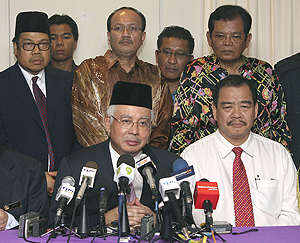Malaysia''s predominant
political party, the United Malays National Organization (UMNO), has held power in
coalition with other parties since Malaya''s independence in 1957. In 1973, an alliance of communally based parties was replaced with a broader
coalition — the Barisan Nasional — composed of fourteen parties. The
political process in Malaysia has generally been described as taking the form of "consociationalism" whereby "communal interests are resolved in the framework of a grand coalition""Malaysia: Developmental State Challenged". In
Government and Politics in Southeast Asia'' The executive branch has tended to dominate political activity, with the
Prime Minister''s office being in a position to preside "over an extensive and
ever growing array of powers to take action against individuals or
organizations," and "facilitate business opportunities". Critics
generally agree that although authoritarianism in Malaysia preceded the
administration of Mahathir bin Mohamad, it was he who
"carried the process forward substantially" Legal scholars have
suggested that the political "equation for religious and racial harmony"
is rather fragile, and that this "fragility stems largely from the
identification of religion with race coupled with the political
primacy of the Malay people colliding with the aspiration of other
races for complete equality."
Like the desire of a segment of the Muslim community for an Islamic State,
the non-Malay demand for complete equality is something that the present Constitution will not be able to
accommodate. For it is a demand which pierces the very heart of the political
system — a system based upon Malay political pre-eminence. It is a demand that
challenges the very source of Malay ruling elites'' power and authority.
In early September 1998, Prime Minister Mahathir bin Mohamad dismissed Deputy
Prime Minister Anwar Ibrahim and accused Anwar of immoral and
corrupt conduct. Later in
September, Anwar was arrested, beaten while in prison (by among others, the
chief of police at the time), and charged with corrupt practices, in both legal
and moral contexts, charges including obstruction of justice and sodomy.
In April 1999, he was convicted of four counts of corruption and sentenced to
six years in prison. In August 2000, Anwar was convicted of one count of sodomy
and sentenced to nine years to run consecutively after his earlier six-year
sentence. Both trials were viewed by domestic and international observers as
unfair. Anwar''s conviction on sodomy has since been overturned, and having
completed his six-year sentence for corruption, he has since been released from
prison.The current Prime Minister is Dato'' Seri Abdullah Ahmad Badawi (colloquially
known as "Pak Lah"). He took office following the retirement of Dr.
Mahathir (now Tun Dr. Mahathir) on October 31, 2003. He is seen as a more
compromising and affable figure as opposed to Tun Dr. Mahathir''s more
confrontational and direct style. He has pledged to continue Tun Dr. Mahathir''s
growth oriented policies, while taking a less belligerent stance on foreign
policy than Tun Dr. Mahathir, who has regularly offended Western countries, the
United States
of America and Australia in particular.
In the March 2004 general election,
Dato'' Seri Abdullah Ahmad Badawi led Barisan Nasional
to a landslide victory, in which Barisan
Nasional recaptured the state of Terengganu.
The coalition now controls 92% of the seats in Parliament. In 2005, Mahathir
stated that "I believe that the country should have a strong government
but not too strong. A two-thirds majority like I enjoyed when I was prime
minister is sufficient but a 90% majority is too strong. We need an
opposition to remind us if we are making mistakes. When you are not opposed you
think everything you do is right."
The national media are largely controlled by the government and by political
parties in the Barisan Nasional/National Front ruling
coalition and the opposition has little access to the media. The print media
are controlled by the Government through the requirement of obtaining annual
publication licences under the Printing and Presses Act. In 2007, a
government agency — the Malaysian Communications and Multimedia Commission —
issued a directive to all private television and radio stations to refrain from
broadcasting speeches made by opposition leaders. The official state ideology
is the Rukunegara,
which has been described as encouraging "respect for a pluralistic,
multireligious and multicultural society". However, political scientists
have argued that the slogan of Bangsa, Agama, Negara (race, religion,
nation) used by UMNO constitutes an unofficial ideology as well. Both
ideologies have "generally been used to reinforce a conservative political
ideology, one that is Malay-centred"
Malaysia is a federal constitutional elective
monarchy. It is nominally headed by the Paramount Ruler or Yang di-Pertuan Agong, commonly
referred to as the King of Malaysia. Yang di-Pertuan Agong are selected for
five-year terms from among the nine Sultans
of the Malay states;
the other four states, which have titular Governors, do not participate in the
selection. The king also is the leader of the Islamic faith in Malaysia. The
system of government in Malaysia is closely modeled on that of Westminster parliamentary system, a legacy of British
colonial rule. In practice however, more power is vested in the
executive branch of government than in the legislative, and the judiciary has
been weakened by sustained attacks by the government during the Mahathir era. Parliamentary elections are held at least
once every five years, with the last general election being in March 2008.
Since independence in 1957, Malaysia has been governed by a multi-racial
coalition known as the Barisan Nasional (formerly the Alliance).
Executive power is vested in the cabinet led by the prime minister; the Malaysian constitution stipulates that the prime
minister must be a member of the lower house of parliament who, in the opinion of the Yang
di-Pertuan Agong, commands a majority in parliament. The cabinet is chosen from
among members of both houses of Parliament and is responsible to that body.
In recent years the opposition have been campaigning for free and fairer
elections within Malaysia.


